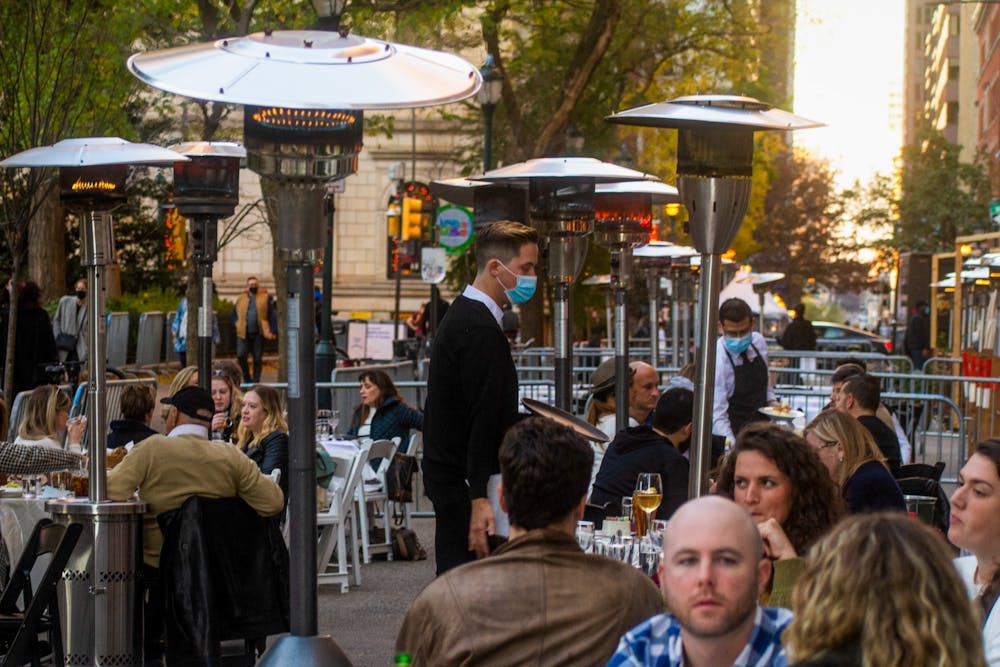
Life at Penn was in disarray after students left campus in spring 2020. A year after the start of the COVID-19 pandemic, however, Penn’s decision to bring back students for the spring 2021 and fall 2021 semesters seemed to be a positive sign for a return to post-pandemic normalcy for both campus and Philadelphia businesses.
Many local restaurants and stores in Philadelphia reported that they were struggling due to pandemic restrictions imposed by the federal and state governments and a lack of foot traffic in University City. The return of students to campus boded well for many local businesses after a year of financial hardship brought on by the pandemic.
Jan. 10 — After the University’s decision the previous month to transition to a hybrid learning model with virtual instruction but on-campus residence, more than 3,000 students elected to live on-campus for the spring semester.
Jan. 25 — Philadelphia community members reported feeling blindsided by this decision as the University did not notify the surrounding area about its plans in advance. While some city residents expressed hope for the potential benefits local restaurants would see from the influx of students, others maintained that the University made the wrong call altogether.
Feb. 22 — After a year of fiscal hardship stemming from the pandemic, city officials reported that Philadelphia was facing a $450 million deficit, and they speculated that it could take the city years to recover. They projected that Philadelphia would soon only have enough money in its reserves to run the city for three days, The Philadelphia Inquirer reported.
March 5 — As COVID-19 cases declined in the spring, Philadelphia began to ease its pandemic restrictions. Beginning in March, the city announced that restaurants would once again be allowed to seat six people per table in outdoor dining. Professional sports teams were also able to resume housing spectators in their stadiums at limited capacity, and senior centers opened for the first time since March 2020.
March 26 — The City of Philadelphia unveiled “Ready. Set. Philly!” a $1.5 million initiative that aimed to prop up many small businesses struggling during the pandemic over the next year. The initiative allowed employers to welcome employees back to work as a next step towards post-pandemic normalcy.
April 6 — The Daily Pennsylvanian spoke to local food truck owners who reported difficulty keeping their businesses afloat even as thousands of students returned to campus for the spring semester. While businesses reported a slight increase in customers from the previous fall, business owners told the DP that sales were still far below what they were prior to the onset of the pandemic.
In 2020, Philadelphia offered $30 million to support small businesses including food trucks. Despite this aid, multiple food truck owners reported difficulties requesting the financial assistance, with some having never heard back from the city at all.
June 28 — By the end of June, seventy percent of adults in Philadelphia had received their first dose of the vaccine, ahead of President Biden’s target date of July 4.
The city had championed many initiatives to encourage Philadelphia locals to get vaccinated. One initiative, implemented in partnership with the University, was the “Philly Vax Sweepstakes” which aimed to incentivize individuals from areas with low vaccination rates to get vaccinated, awarding monetary rewards of up to $50,000.
Sept. 21 — Many local restaurants and food trucks began to see returns to pre-pandemic revenue levels owing to the fact that nearly all Penn students returned to campus for the fall 2021 semester.
Local bars and restaurants like Smokey Joe’s and Greek Lady opened back up to full capacity. Other eateries like Magic Carpet Foods and Allegro Pizza & Grill that suffered financial losses during the pandemic reported a significant uptick in business once students returned to campus for New Student Orientation.
Oct. 25 — University City foot traffic reached pre-pandemic levels, bolstered by the increased residential population and influx of tourists and shoppers, WHYY reported. Conversely, Center City has not seen the same uptick in traffic as many workers had not yet returned to their in-person jobs.
The Daily Pennsylvanian is an independent, student-run newspaper. Please consider making a donation to support the coverage that shapes the University. Your generosity ensures a future of strong journalism at Penn.
Donate







